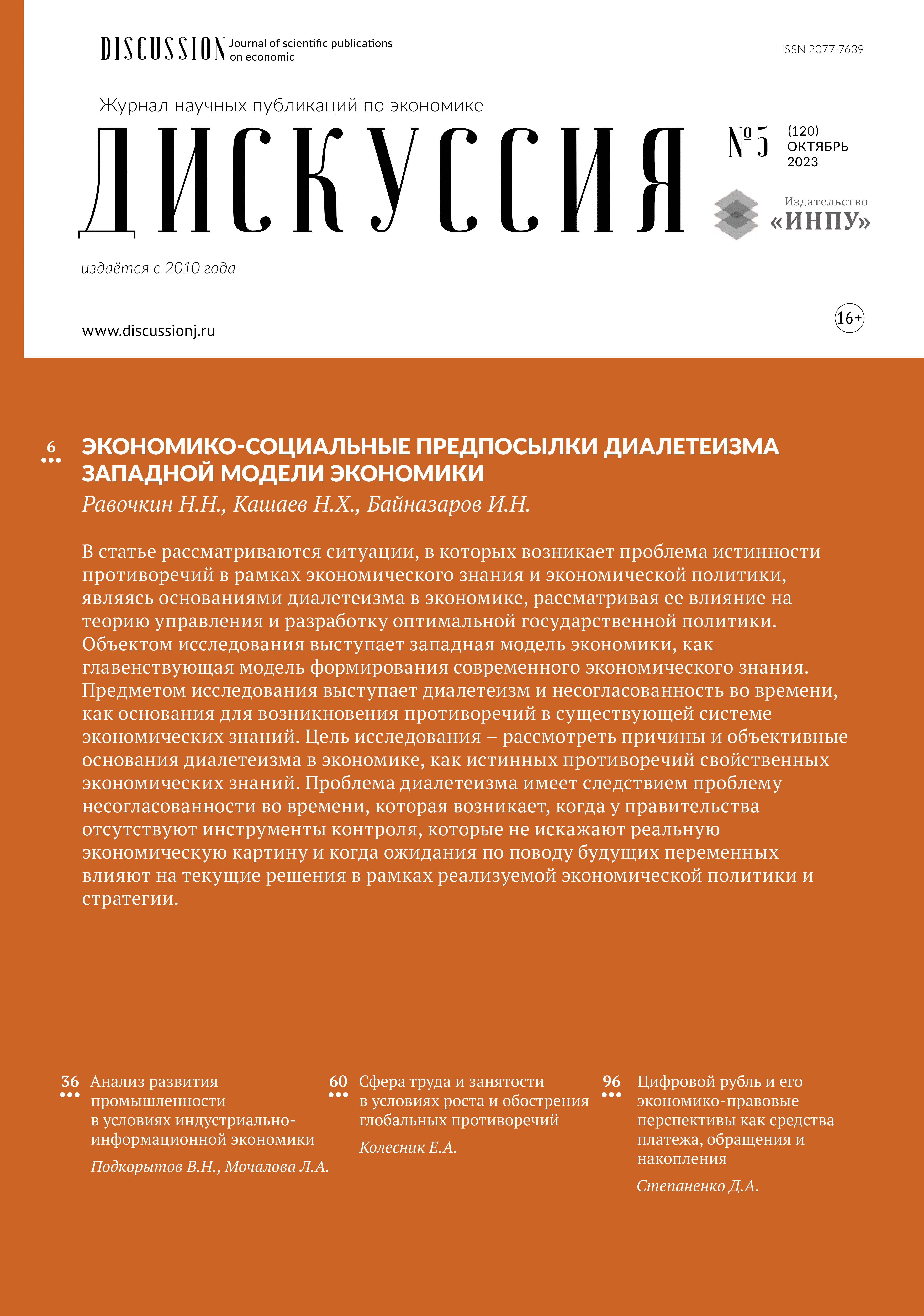СФЕРА ТРУДА И ЗАНЯТОСТИ В УСЛОВИЯХ РОСТА И ОБОСТРЕНИЯ ГЛОБАЛЬНЫХ ПРОТИВОРЕЧИЙ
Ключевые слова:
наем, дефицит кадров, кадровый голод, безработица, уровень занятости, цифровые навыки, вакансия, резюмеАннотация
Актуальность исследования определяется двумя факторами: изменение на мировом рынке труда, связанные с цифровизацией бизнес –процессов и бизнес – среды; рост геополитической напряжённости и глобальных противоречий во всём мире. Объект исследования – рынок труда; предмет исследования – состояние сферы труда и занятости в рамках национальной экономики. Цель исследования – рассмотреть состояние сферы труда и занятости в рамках мировых и национальных системных состояний экономики. В статье представлены достоверные статистические данные по состоянию мирового рынка труда и национального рынка труда. Рассмотрены показатели и уровни занятости, временной занятости, обеспечения рабочей силой, изменения вакансий по отраслям национальной экономики. В результате исследования выделяются основные тренды на рынке труда в мире и России. Делается вывод, что несмотря на острый дефицит кадров, особенно технических специалистов, вызванным ростом и обострением глобальных противоречий показатели сферы труда и занятости не отражают критических структурных потрясений. Тем не менее угроза кадрового голода и дефицита кадров только возрастает при отсутствии стратегии снижения рисков на рынке труда.
Скачивания
Метрики
Библиографические ссылки
О влиянии санкций 2022 года на рынок труда российской Федерации / С. А. Беляев, Д. В. Зюкин, Е. В. Репринцева, Е. В. Малышева // Вестник Курской государственной сельскохозяйственной академии. – 2022. – № 7. – С. 167-175. – EDN ABAVUZ.
Стремоусова, Е. Г. Специфика развития рынка труда России в условиях внешнеэкономических санкций / Е. Г. Стремоусова, П. С. Каргаполова // Теория и практика мировой науки. – 2023. – № 8. – С. 10-14. – EDN LTDOZC.
Былков, В. Г. Трансформация регионального рынка труда под действием санкций / В. Г. Былков // Известия Байкальского государственного университета. – 2022. – Т. 32, № 4. – С. 732-740. – DOI 10.17150/2500-2759.2022.32(4).732-740. – EDN KOJGFD.
Edmans A. et al. Employee satisfaction, labor market flexibility, and stock returns around the world //Management Science. – 2023. DOI 10.1287/mnsc.2023.4889.
Bertola G., Blau F. D., Kahn L. M. Labor market institutions and demographic employment patterns //Global Labour in Distress, Volume II: Earnings,(In) decent Work and Institutions. – Cham : Springer International Publishing, 2023. – С. 477-527. DOI 10.1007/978-3-030-89265-4_23.
Donovan K., Lu W. J., Schoellman T. Labor market dynamics and development //The Quarterly Journal of Economics. – 2023. – Т. 138. – №. 4. – С. 2287-2325. DOI 10.1093/qje/qjad019.
Vyas L. “New normal” at work in a post-COVID world: work–life balance and labor markets //Policy and Society. – 2022. – Т. 41. – №. 1. – С. 155-167. DOI 10.1093/polsoc/puab011
Hoffmann E. B., Malacrino D., Pistaferri L. Earnings dynamics and labor market reforms: The Italian case //Quantitative Economics. – 2022. – Т. 13. – №. 4. – С. 1637-1667. DOI 10.3982/QE1865.
Christiaensen L., Maertens M. Rural employment in Africa: Trends and challenges //Annual Review of Resource Economics. – 2022. – Т. 14. – С. 267-289.
Delgado Prieto L. A. Immigration, wages, and employment under informal labor markets. – 2022.
Alazzawi S., Hlasny V. Youth labor market vulnerabilities: Evidence from Egypt, Jordan and Tunisia //International Journal of Manpower. – 2022. – Т. 43. – №. 7. – С. 1670-1699. DOI 10.1108/IJM-04-2021-0239
Hall R. E. A theory of the natural unemployment rate and the duration of employment //Journal of monetary economics. – 1979. – Т. 5. – №. 2. – С. 153-169. DOI 10.1016/0304-3932(79)90001-1.
Yüksel N. et al. Review of artificial intelligence applications in engineering design perspective //Engineering Applications of Artificial Intelligence. – 2023. – Т. 118. – С. 105697.
Tilmes N. Disability, fairness, and algorithmic bias in AI recruitment //Ethics and Information Technology. – 2022. – Т. 24. – №. 2. – С. 21. DOI 10.1007/s10676-022-09633-2.
Кокин, А. В. Искусственный интеллект в криминалистике и судебной экспертизе: вопросы правосубъектности и алгоритмической предвзятости / А. В. Кокин, Ю. Д. Денисов // Теория и практика судебной экспертизы. – 2023. – Т. 18, № 2. – С. 30-37. – DOI 10.30764/1819-2785-2023-2-30-37. – EDN DNMRLF.
Magano J. et al. Generation Z: Fitting project management soft skills competencies—A mixed-method approach //Education sciences. – 2020. – Т. 10. – №. 7. – С. 187. DOI 10.3390/educsci10070187.
Ismail D. H., Nugroho J., Rohayati T. Literature Review: Soft Skill Needed by Gen Z in the Era RI 4.0 and Society 5.0 //Majalah Ilmiah Bijak. – 2023. – Т. 20. – №. 1. – С. 119-131.
Коновалова, В. Г. «Тихие» тенденции в управлении персоналом: новые термины или новые проблемы? / В. Г. Коновалова // Управление персоналом и интеллектуальными ресурсами в России. – 2023. – Т. 12, № 4. – С. 21-26. – DOI 10.12737/2305-7807-2023-12-4-21-26. – EDN QCVOOX.
Загрузки
Опубликован
Как цитировать
Выпуск
Раздел
Категории
Лицензия
Copyright (c) 2024 Е. А. Колесник

Это произведение доступно по лицензии Creative Commons «Attribution-NonCommercial-NoDerivatives» («Атрибуция — Некоммерческое использование — Без производных произведений») 4.0 Всемирная.
Авторы, публикующие произведения в журнале «Дискуссия», соглашаются со следующими условиями:
- Авторы сохраняют за собой авторское право и предоставляют журналу право первой публикации произведения, одновременно лицензированной в соответствии с лицензией Creative Commons Attribution, позволяющей другим лицам пользоваться произведением с подтверждением авторства и первоначальной публикации в журнале «Дискуссия».
- Авторы вправе заключать с иными лицами лицензионные договоры на условиях простой (неисключительной) лицензии на использование опубликованного в журнале «Дискуссия» произведения (например, размещение его в базах данных университетов, публикация в книге), со ссылкой на его оригинальную публикацию в этом журнале.
- Автор гарантирует, что является правообладателем всех материалов, предоставляемых в редакцию, и что исключительные права на данные материалы не переданы или не предоставлены другим лицам.
- Авторам разрешено и рекомендуется размещать свое произведение в Интернете до и во время процесса подачи, поскольку это может привести к продуктивному обмену, а также к более раннему и более широкому цитированию опубликованных работ.
С момента загрузки произведения и сопроводительных материалов через раздел "Отправка материалов", автор полностью и безоговорочно принимает (акцептует) публичную оферту о заключении авторского соглашения об опубликовании произведения. В соотвтетствии с этим соглашением автор предоставляет издателю на безвозмездной основе неисключительную лицензию на использование созданного автором произведения.
С момента получения произведения и прилагаемых к нему материалов журнал "Дискуссия" вправе использовать полученные произведения без ограничений по своему усмотрению и в пределах всего срока действия исключительных прав, но с обязательным указанием имени автора (авторов) произведения, в том числе публиковать произведения (полностью или в сокращении) на территории всего мира, переводить на другие языки, направлять в репозитории научной информации, размещать в сети Интернет и использовать другими законными способами.









